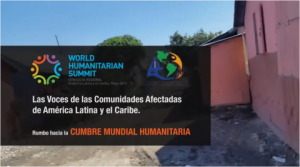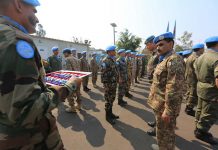
This is a revised and extended version of the blog published in July 2015 in German; forhumhilfe.org/2015/07/13/gastbeitrag-whs-und-wchs-zwei-humanitaere-weltkonferenzen-im-vergleich/
2016 is the year of the mobilization of the global humanitarian community: the World Humanitarian Summit (WHS) organized by the UN system in Istanbul and the World Conference of Humanitarian Studies (WCHS) in Addis Ababa. The first is a unique attempt to take stock of what has been achieved and what needs to be achieved to improve the situation of the people in need of life saving activities. The second is the biannual event bringing together practitioners, scholars, and representatives of national government representatives and international governmental organizations. The first conference is one of the typical major international events even though, this time being organized with the participation of all the actors involved in humanitarian activities, UN, governments, NGOs and business. The second event analyzes the state of the humanitarian system, its successes and failures, new approaches or new political developments of the field from a scholarly perspective.
The WHS is the end product of a two-year consultation process in the different world regions in order to identify core problems and develop solutions for the increasingly complex international humanitarian system. As indicated above, all the relevant groups were included in this process.
The WCHS is a recurrent attempt to take stock of and analyze existing humanitarian practices, assess to their impact, and point to the difficulties if not impossibility for principled humanitarian action but also to discuss innovations in the field. Even though it is premature to draw any major conclusions about the results of these two events a comparison of the agendas may reveal how similar or different the focus of the two is. In other words, how different or similar their world-views are.
The agenda of the WHS is arranged along four basic issues:
- Humanitarian effectiveness;
- Reducing vulnerabilities and managing risk;
- Transformation through innovation;
- Serving the needs of people in conflict.
The agenda of the WCHS is not that different from that of the WHS and is also arranged along four themes:
- Humanitarian crises and development;
- Conflict and humanitarianism;
- The implications of climate change for humanitarian studies;
- New partnerships, new technologies, and professionalism in crisis response.
It is obvious that the two agendas share quite a number of similarities emphasizing conflict and innovations/technologies. It is left to the organizers of both events how the themes will be elaborated in detail. First of all, it is not necessarily clear what the political priorities are. And second, it is not that important which themes are relevant (they all are), but how they are translated into practice. In other words, the two events share a rather similar worldview, their main differences will become clear in the ways their themes will be worked out during implementation.
In this respect, the Secretary General of the United Nations has defined as the core objective of the WHS:
“… the Summit will be held in Istanbul and asked countries to help map out a humanitarian agenda for the future that is more effective and inclusive, and which addresses the significant challenges facing the world. … Conflict and natural disasters, combined with rapid population growth, persistent poverty and climate change mean that ever more people need help every year,” … We need to find innovative ways to make humanitarian action more effective and inclusive to respond to the challenges of the future” (New York, 26 September 2013)
Nobody would disagree with his observations. But is not a much more precise statement required? Is the problem of humanitarian aid primarily one of politics? After all, humanitarian action cannot address the root causes of crises; politicians are responsible for addressing these. We are skeptical about six issues that are hard to address in practice, namely:
- Sometimes one has the impression that the humanitarian problems are hidden behind technocratic issues such as money, technology, partnerships or coordination. In the end, is humanitarian aid used as the substitute for security policy?
- Humanitarian aid, in particular in armed conflicts is regulated by international humanitarian law (IHL). Unfortunately states do not agree as to the application of the second additional protocol. How relevant is IHL today? Think about Syria. How seriously do states, international organizations and non-state actors still take this body of law?
- The first two remarks seem to point to central issues at the center of the humanitarian aid system today. A crucial precondition for effective humanitarian action is that states, individually and collectively, comply with the principles of humanitarian action as they agreed on in IHL. But this is less and less the case. It is hard to believe that these conferences can avoid this particular issue.
- Another core issue is to overcome the so-called silo structure of the system, implying that each sector if not even the actors in a particular area try to seal themselves off from other actors and/or sectors. Development aid and humanitarian aid serve to illustrate this issue. What are the potential consequences of such a silo-strategy?
- A related issue is to what extent the continuous mandate enlargement of many humanitarian organizations is counterproductive to the humanitarian mission. Should the answer not be coordination between organizations from different sectors as difficult as this may be? For example, global climate change is not really an issue of humanitarian NGOs, contrary to the question how to get prepared for the consequences of climate change if politics is either opposed to or only mildly interested and willing to pursue a systematic collective policy to mitigate the effects of global warming.
- We believe that one of the core problems is probably the need to achieve a consensus among all the actors, not just conceptually but operationally. As long as NGOs and governments pursue their own interests rather than optimizing their activities through coordination and cooperation their overall impact will be suboptimal.
Even though the agendas of both conferences seem to share considerable commonalities, none of the problems mentioned shows up explicitly in them, Maybe in both forums these issues will be treated explicitly, and then both Istanbul (WHS) and Addis Ababa (WCHS) will be a success and resulting in future synergies between them. We hope that this will be the case, and that our skepticism is unjustified.
Dennis Dijkzeul and Wolf-Dieter Eberwein
Ruhr-Universität Bochum.
Wolf-Dieter Eberwein, professor retired Science Po Grenoble, member of de board of the Fond de la Croix Rouge.
Derniers articles parDennis Dijkzeul and Wolf-Dieter Eberwein (voir tous)
- Mobilizing the Global Humanitarian Community – 30 septembre 2015







